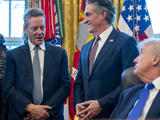US-Ukraine-Saudi Arabia Talks on Ceasefire: A Delicate Dance of Diplomacy
Recent meetings in Saudi Arabia’s Al-Arabiya city between US and Ukrainian representatives have sparked cautious optimism about a potential temporary ceasefire in the ongoing Ukraine-Russia conflict. Xinhua reported that the discussions concluded with both parties agreeing on a 30-day temporary ceasefire proposal put forth by the United States. Ukraine's willingness to accept this proposal hinges on Russia's agreement to partake in and adhere to the ceasefire as well.
This story has been covered extensively by both People's Daily and Voice of America, with each providing their distinct perspective on the implications. People's Daily emphasized the harmonious aspects of the meeting, notably the United States' commitment to resuming intelligence sharing with Ukraine and reestablishing security assistance. It highlighted Ukraine's acceptance of the US-proposed ceasefire as a constructive step, contingent upon Russia's compliance.
In contrast, Voice of America focused on the strategic underpinnings of these developments. It suggested that President Trump's administration is eager to pressure Russia into participating in constructive talks, aiming to expedite the resolution of the conflict. The report mentions ongoing plans for further discussions with Russian officials, indicating the USA’s active role in pursing diplomacy in an effort to stabilize the region.
The varying narratives offered by these publications indicate differing agendas. Xinhua News Agency presents the news with a tone emphasizing multilateral cooperation and mutual understanding, possibly to project an image of China's advocacy for global peace. On the other hand, the People's Daily portrays the meeting as an achievement borne from sustained diplomatic engagements. Meanwhile, Voice of America presents a narrative underscoring US strategic initiatives, likely attempting to reinforce the perception of the US as a peace-seeking global leader while still reminding audiences about the geopolitical responsibilities.
The impact of these discussions is significant both regionally and globally. Regionally, a ceasefire may bring a temporary halt to the humanitarian crisis caused by the conflict in Ukraine, potentially providing a foundation for longer-term peace negotiations. Globally, this move demonstrates the influence of diplomatic channels over military solutions in conflict resolution. It reflects a strategic push by the United States to address conflicts in its allied territories, which could also affect relations with Russia moving forward. As these talks unfold, the world watches how these narratives intersect and unfold into real-world policies impacting global geopolitical stability.


